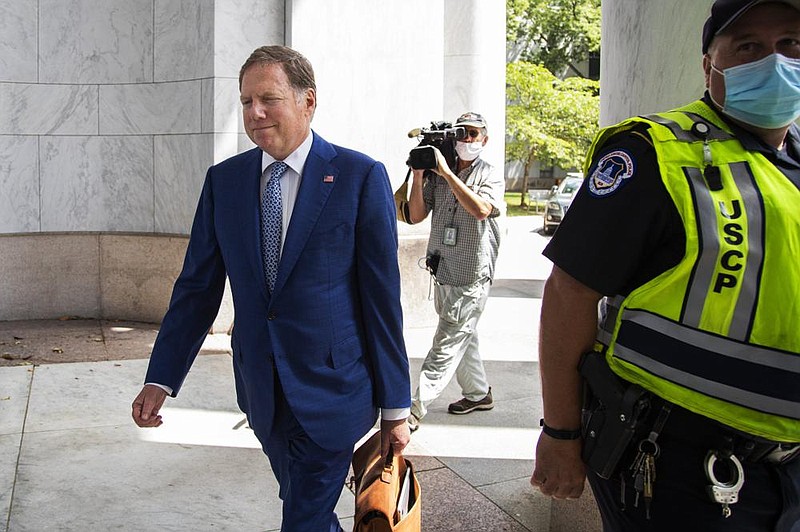A former top prosecutor in New York said he was pressured by Attorney General William Barr to resign last month and take another job.
Former U.S. Attorney Geoffrey Berman, who testified privately before the House Judiciary Committee on Thursday, described in a written statement the unusual sequence of events that led to his departure June 20.
"The Attorney General said that if I did not resign from my position I would be fired," he said in his statement, a copy of which was obtained by The Washington Post. "He added that getting fired from my job would not be good for my resume or future job prospects. I told him that while I did not want to get fired, I would not resign."
Portions of the statement were first reported by Axios.
In addition to discussing the Securities and Exchange Commission chairmanship, Barr also offered Berman a job as head of the Justice Department's Civil Division; Berman was not interested in either position.
The revelation of Barr's pressure tactics adds to the picture of what was already known about the events that culminated in Berman stepping down as suspicions swirled that he was being ousted for political reasons. The administration's critics, without evidence, have said they believe that President Donald Trump wanted him gone because Berman's prosecutors had been investigating the president's allies, including Trump's personal lawyer Rudy Giuliani.
Thursday's closed session is part of the committee's inquiry into Barr's management of the Justice Department and what Democrats deem his "unprecedented politicization" of the historically apolitical agency.
Barr is to testify publicly before the committee at the end of July.
After Berman's testimony ended, the committee's chairman, Rep. Jerrold Nadler, D-N.Y., told reporters, "We don't know yet if the attorney general's conduct is criminal, but that kind of quid pro quo is awfully close to bribery."
Committee Republicans dismissed the testimony of Berman, a lifelong Republican and party donor. "Berman provided no testimony today that any case involving the president or any other human being was at all a part of the decision to move him out of the Southern District," Rep. Matt Gaetz, R-Fla., said.
Berman had informed the panel in advance that he would not discuss ongoing investigations or speculate on the reasons for his removal.
The Justice Department declined to comment Thursday on Berman's statement and referred to previous Barr remarks. In an NPR interview last month, Barr said Berman, who was appointed to the position by federal judges, "was living on borrowed time from the beginning."
He said that "when a really strong, powerful candidate raised his hand" for the U.S. attorney job, referring to SEC Chairman Jay Clayton, Barr saw "an opportunity to put in a very strong person as a presidential appointment to that office."
Berman's departure capped developments June 19 when Berman met Barr for roughly 45 minutes in a suite at the Pierre hotel in Manhattan.
Barr said that he "wanted to make a change in the Southern District of New York," Berman wrote. Barr said there was an opening as the head of the department's civil division and asked Berman to take that job, saying that it would create an opening for Clayton.
Berman responded that he "loved" his job and asked the attorney general if he were "in any way dissatisfied" with his performance. Barr said he was not and the move was "solely prompted by Jay Clayton's desire to move back to New York" and the "administration's desire to keep him on the team."
Barr repeatedly urged Berman to take the civil division position. Berman declined and said he would leave when a nominee was confirmed. He told Barr there were important investigations he wanted to see through to completion.
At 9:15 that night, Barr announced that Berman was stepping down, that Trump planned to nominate Clayton to take his place and that the president would appoint the U.S. attorney for the District of New Jersey, Craig Carpenito, to oversee the New York office in an acting capacity in the interim.
In what Berman called a "critical concession," Barr stated that Berman's deputy, Audrey Strauss, and not Carpenito, would serve as acting U.S. attorney until a successor could be confirmed.
"With that concession and having full confidence that Audrey would continue the important work of the office, I decided to step down and not litigate my removal," he wrote.
